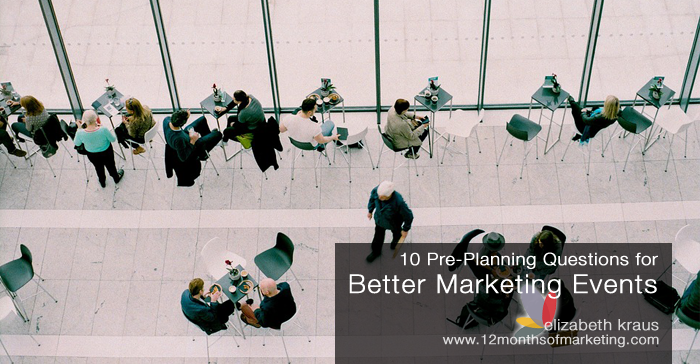Marketing Event Planning: Answer these 10 Pre-Planning Questions
It’s a Date! Have you overlooked any of these important marketing event planning details?
Your Marketing Event Planning Checklist
When thinking about throwing a major event like a marketing event that will help you increase sales, generate new business leads or increase customer loyalty and retention, you might think of the event itself as the biggest part of the process.
In reality, most of the real work of an event occurs in the pre-event planning phase. Marketing event planning might entail weeks or even months of strategizing, scheduling, ordering and other pre-event work. Planning the details of what will occur at an event, who you want to attend and what you want to accomplish (or what will happen afterward) is critical if you (a) want your event to be successful and (b) want your guests to enjoy the event (so they’re more likely to take the actions you want them to take!)
Event Planning Rule #1: Always Keep Your Goal in Mind
It’s easy to get carried away with all the possibilities – all the things you might do at an event. However, whether your event is being held to help celebrate a business milestone or attract and engage marketing prospects, rule number one holds true: Every decision should reinforce your core event goal(s).
Measure your decisions by their relevance to your main event goal and eliminate activities which could be a distraction or don’t contribute to the goal in any way. By keeping your focus on one main objective, you will not only make better planning decisions, but you’ll prevent the addition of activities that add cost but don’t contribute to the results you want.
Marketing Event Planning: Answer these 10 Questions to Improve Business Outcomes
To help you make sure that you don’t overlook important details in the event planning process, answer these ten questions:
1. To Be Considered a Success, What Has to Happen?
No matter how much fun attendees have or how many people showed up to your business event, if you didn’t achieve your goal, it was not a success.
Make a list of potential ROI your business or marketing event could produce and rank them in order of priority. The desired outcomes at the top of this list should guide all the decisions you make about who should attend and what should happen at your event.
2. Who do you (most) want to attend?
Depending on the importance of those individuals or company representatives you absolutely need to have in attendance, set your event date based on their schedules as well as your overall event goal. Likewise, what will happen at the event should be geared toward the interests of your ideal attendee persona.
3. How many will be invited, and how many are likely to be in attendance?
The number of people at your event will determine everything from your costs, to need for food and beverages, space, audio-visual equipment, presentation platform, chairs and tables and a myriad of other event planning details. If your event will be held virtually, the number of potential attendees will affect your costs relative to webinar platform or conference calling.
4. How will you invite guests or get registrations?
Depending on whether you will be holding a casual get-together, a formal, large scale event or a business event small or large, you have a lot of options to consider. Keep in mind that printed invitations can be more effective, since they are tangible and are often kept as mementos in and of themselves. However, you can choose to invite all your guests via email or social media and collect RSVPs electronically as well. If you are holding a virtual event, sending email and social media invitations could be all that is needed to fill up your event.
5. Do you need an attendee count?
To finalize setup, catering, business presentation copies or other event details you may need a final count on the number of guest who plan to attend. If you need RSVPs from invitees, make it easy for them to respond with a pre-stamped postcard, online registration or voice message line. If it’s a virtual event, make sure that the registration or reservation button is prominent – easy to find and click on. If you need to send invitations and allow for time for RSVPs, keep this in mind as you plan when you will send out your invitations and any reminders.
6. Will there be a cost?
If you’re hosting an event for which attendees would be willing to pay, you may be able to charge money to attend your event in order to offset facility costs, materials costs, fees for a guest speaker, catering or other costs. During the event planning process, calculate not only how much you need to charge but also how you will collect the event fee (pre-paid ticket sales or registration fee, fee paid at the door, cash, check or credit, etc.) And if there will be a cost for your event, remember to include that information on your print or electronic event invitations.
7. What will happen at the event?
The activities you that must take place during the event will determine, in part, the event’s duration and might also dictate where an event may or may not be held. (And don’t forget event planning rule #1: Measure any and all possible event activities against the goal of your event, to prevent undermining of your event goals!) In addition, you may need to allow for extra time such as a 5 to 15-minute grace period from the start of the event, after breaks, and time following the event for socializing, Q & A, selfies with the presenter or other dignitaries, etc.
8. What day will you hold the event, and when will the event begin and end?
Beginning and end times, as well as planned activities, will help you set a final timeline during the event planning process. Contracted event services (such as event caterers, DJs, Entertainers, Public Speakers and others) will need to know when to arrive, when and where to set up, when to begin their portion of the event, etc.
9. Where will you hold the event?
Whether virtual or in-person, your event facility may need to meet certain requirements (such as number that can be accommodated) or have certain equipment (such as a commercial kitchen, electricity, sound system, tables, chairs, webinar software, computer microphone and camera, etc.)
You might also like: 4 Keys to Producing a Virtual Event (carlstromproductions.com)
Note: In the pre- event planning phase, the answer to the last three questions are critical so that you can arrange for catering or plan your menu. And obviously they are details you will need to know before you can even invite guests or sell tickets to your event.
10. Who can help you?
Just answering these questions may have revealed to you that you need help during the event planning and set up phase as well as at the event itself, such as assigning host or hostess duties, emcee, buffet or waitstaff, bartender, coat check, greeter or any other number of assigned responsibilities. If you need to be accessible during the event or will be carrying out host or MC duties, plan to delegate a significant amount of the coordination, trouble-shooting and behind-the-scenes work that goes on during the event.
One final note for the pre- event planning process: Don’t forget that you will need people to help with set up, take down and cleanup (unless you want to do it all yourself!)





